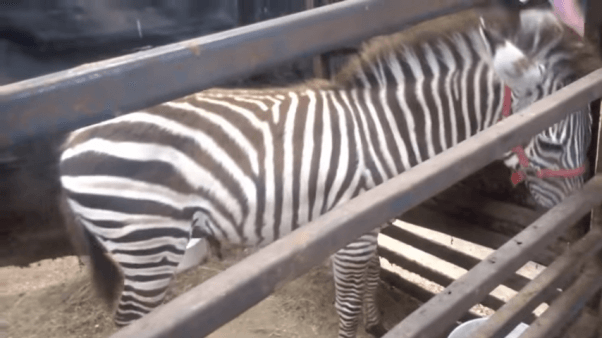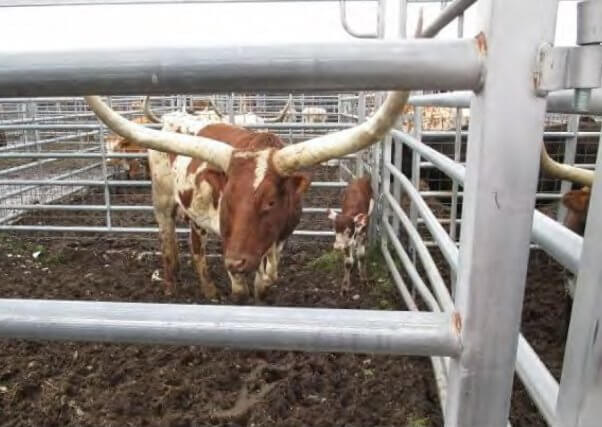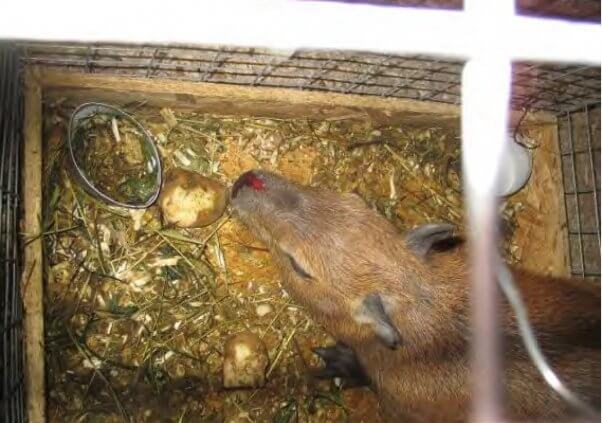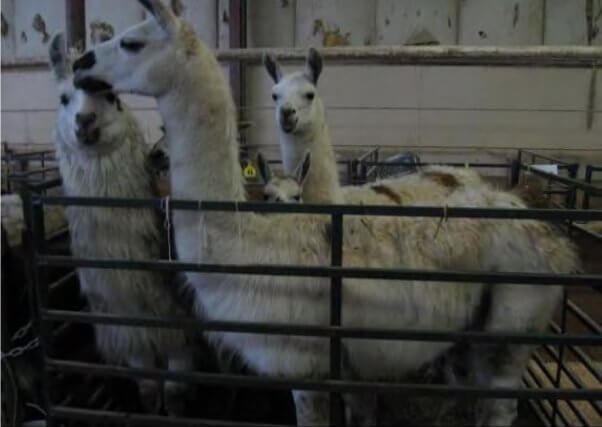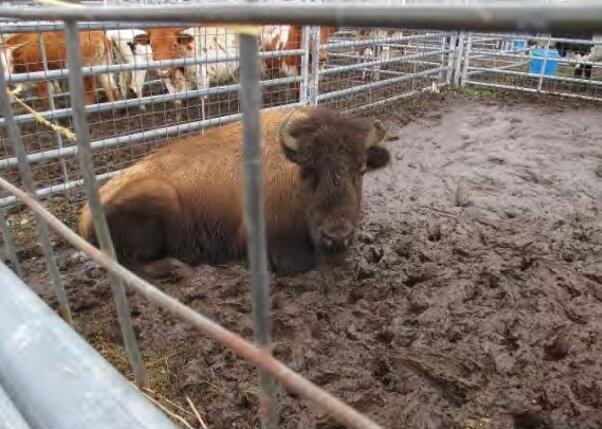Roadside Zoos and Exotic-Animal Breeders Make a Killing at Auctions
Every year in the U.S., breeders and profiteers buy and sell thousands of antelope, primates, wallabies, foxes, and members of other species at seedy events called exotic animal auctions. Farmers who exploit animals for food or fashion buy them at auction events known as “livestock auctions.”
What Are Exotic Animal Auctions?
At exotic animal auctions, sometimes called “alternate livestock auctions,” several species are sold to the highest bidder with little regard for their welfare. Many of these animals include exotic hoofed mammals—such as zebras, antelope, zebus, and watusis—but exotic animal auctions also often include dozens of bird species for sale. Peddlers sell small mammals such as hedgehogs, guinea pigs, and rabbits at auctions, and many events feature reptiles for sale. The auction houses are part of a “robust billion-dollar U.S. trade in exotic animals.”
Where Are Exotic Animal Auctions Held?
Exotic animal auctions are held often, all over the country. Here are just a few examples:
1. Missouri’s Lolli Bros. Livestock Auction
This is one of the primary “alternative” livestock auctions in the country. It’s held quarterly every year. Covert footage from this event revealed a horror show of workers physically abusing animals on the auction block, and backstage, emaciated and distressed animals were confined to cages so small that they couldn’t even turn around inside them. Many of the exotic animals sold from Lolli Bros. go to breeders who supply the exotic “pet” trade in the U.S., and many roadside zoo exhibitors trade animals at this market.
- According to public licensing documents from the U.S. Department of Agriculture (USDA), Lolli Bros. sold between 10,000 and 15,000 animals each year from 2010 to 2014, earning an average of $3 million in revenue annually.
- Lolli Bros. has been cited by the USDA for confining cats to cramped cages with no room to turn around or lie down and rabbits, primates, and a fox to unsanitary cages, some of which were filled with waste. It was also cited for keeping rabbits in enclosures with sharp wire protrusions that posed a risk of serious injury.
- Boo Boo, a bear who bit students at a college campus event, was bred by a roadside zoo and sold at Lolli Bros.
2. Triple W Livestock Auction in Tennessee
This animal auction is held quarterly every year. It’s attended by exhibitors and dealers from all over.
- In September 2021, the USDA cited Triple W for accepting over 40 animals—including sugar gliders, chinchillas, a wallaby, and a kinkajou—on consignment from dealers who didn’t hold a valid license, allowing them to make illegal animal sales. It also allowed unlicensed dealers to sell animals (including Patagonian cavies, coatimundis, and kangaroos) at events in 2019.
- The feds have repeatedly cited the auction for failing to provide animals with adequate shelter during auctions held during inclement weather, for keeping animals in cages with soiled bedding, and for failing to provide them with potable water.
- Notorious breeder Jerry Holly has sold zebras and other animals at this exotic animal auction. A zebra escaped from the event in May 2021.
3. Mount Hope Auction in Ohio
This event plays hosts to the annual Mid-Ohio Alternative Animal and Bird Sale every spring. The auction house sold 10,000 animals a year in 2012 and 2013 for an average of $1.3 million a year, according to USDA licensing documents.
- In 2016, the USDA cited this auction for accepting zebras and camels on consignment from dealers who didn’t hold a valid license, allowing them to make illegal animal sales.
4. Fremont Exotic Animal Auction in Nebraska
Held by Nelson Livestock Auctions in the summer and fall, this auction was cited by the USDA in June 2021 for accepting a zebra foal and four foxes consigned from unlicensed dealers, allowing the dealers to make illegal sales.
- The auction was also cited for keeping the foxes in filthy crates so small that they couldn’t freely turn around.
Other exotic animal auctions that took place in 2021 include Heartland Exotic Auction in McCook, Nebraska (held in the spring and fall); Jackson Livestock Exchange Exotic Animal and Bird Auction in Jackson, Minnesota (held in the spring and fall); James River Exotic Animal Sale in Jamestown, North Dakota (held in the spring); JCCC Livestock Sales’ Alternative Animal Sale in Junction City, Kansas (held in the fall); and Topeka Exotic Animal and Bird Auction in Topeka, Indiana (held in the spring and fall).
Who Buys and Sells Animals at Exotic Animal Auctions?
Exotic animal auctions are hubs used by roadside zoos and exotic-animal dealers to make sales. The animals are typically purchased by clientele who want to keep them as personal “pets” or put them on display at roadside menageries or petting zoos.
Some buyers purchase animals at exotic animal auctions to fill their canned hunting ranches for trophy hunters. Roadside zoo operators often sell their surplus animals at these events, not caring whether they end up as victims of a canned hunt. Some exotic-animal breeders and dealers use these events as a key source of revenue, treating sentient beings as mere objects to make a quick buck.
These notorious roadside zoos and dealers have sent animals to auctions:
- Natural Bridge Zoo has shipped animals—including zebras, kudu, ducks, and dozens of guinea pigs—to Lolli Bros. Livestock Auction and Mid-Ohio Alternative Animal and Bird at Mt. Hope Auction.
- Henry Hampton, the owner of The Farm at Walnut Creek in Ohio and Lazy 5 Ranch in North Carolina, has sent animals—including fallow deer, eland, and javelinas—from both facilities to Raz Livestock Sales in Texas. This exotic animal auction is held once a month.
- Jason Clay, owner of Franklin Drive Thru Safari and East Texas Zoo & Gator Park, sent animals—including warthogs, dingoes, coatimundis, monkeys, servals, ostriches—to Gulf Coast Livestock Auction in Florida. This exotic animal sale is held at least five times a year. Previously, Clay sent a 2-week-old camel to Wild Side Auction Services in Oklahoma for its annual exotic animal sale.
- Zootastic Park in North Carolina sent 57 animals—including bison, alpacas, rheas, macaws, squirrel monkeys, and a tamandua—to Gulf Coast Livestock Auction in Florida between April and June 2020. It also sent a 10-day-old patas monkey named Patty to 5-H Ranch Exotic Animal Auction in Missouri for its annual sale.
Never Attend an Exotic Animal Auction
Don’t fund the suffering of animals exploited for entertainment. Stay far away from wildlife auctions: Never buy any animals or attend an exotic animal sale. Urge your friends, family members, and social media followers to do the same.

